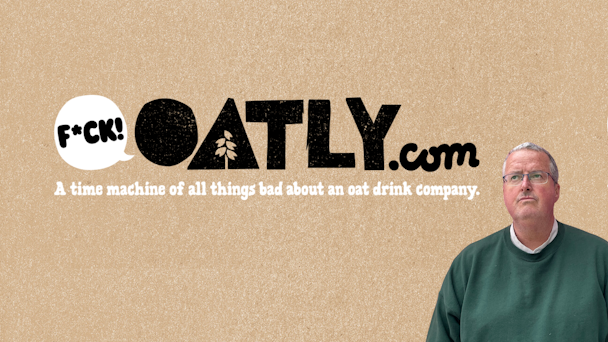I was axed as Oatly's creative director - here are 5 arguably useful lessons
Kevin Lynch was Oatly’s creative director for several years. Then he got the axe. Here's what he learned shaking up the dairy sector.

This summer, I was let go from Oatly, and before my hypnotist succeeds in helping me forget the whole episode ever happened, I figure I should share some things I learned there in the highly unlikely event that you find it beneficial.
It starts with trust.
I’d like to say Oatly’s quality of work reflected the wonderfully talented people producing it. But that would be bypassing the bigger contributor to our success: Trust. Put simply, the people who do the work were entrusted with approving the work.
There was no C-suite swoop–ins at Oatly; no complicated approval processes, no testing, and risk was something that was welcomed, not avoided. All the internal machinations that dull the edges of marketing did not exist. And that’s largely because of trust.
Advertisement
The trust we enjoyed was partially born out of the long–time relationship between Tony Petersson, the CEO who led Oatly’s rebirth in 2013, and John Schoolcraft, the creative leader he brought with him. It was also partially born out of the fact that Tony is one of those rare CEOs who trusts in the power of creativity; and who believes creativity doesn’t belong in a department – it needs to be infused throughout a company. As a result, John’s Oatly Department of Mind Control had an outsized impact not only on the communications but on the company as a whole.
Think revolution, not evolution. Before becoming the Oatly, you know, the company spent almost 20 years being the Oatly you ignored. Beginning with its founding in the ‘90s, Oatly followed all the FCMG rules it could find and created marketing that only a focus group could love. This is not an exaggeration: At the top of the old packaging, there was a handwritten callout saying ‘calcium & vitamin enriched.’ At the bottom of the exact same pack, just in case someone forgot, it claimed the product was ‘enriched with calcium and vitamins.’
Redundancies test wonderfully.
So when it came time for Oatly to change its trajectory – to transform from a food processing company to a lifestyle brand that stands for something more meaningful than just selling oat milk – it was willing to start from scratch, parting ways with the equity and familiarity that had been built up over the last 15+ years. Nothing but the name survived the rebranding. I don’t believe the Oatly of today could’ve arrived through incrementalist thinking and evolution. It required revolution.
Advertisement
Remember, no one cares. One of the most enabling aspects of working on Oatly was the freedom to openly admit that no one gives a shit about what we had to say. (And look, we haven’t met, but I’m willing to wager that people feel the same about your brand, too.)
By acknowledging this indifference, it gave us a much better opportunity to make a connection by meeting our audience where they’re at. “We know you’re probably not thinking about oat milk right now. If we weren’t getting paid to do so, we wouldn’t be either…”
Knowing people aren’t listening also forced us into some behaviors that every brand could benefit from.
First, care about your audience more than you do about yourself. For us, that meant being entertaining took precedence over being informative.
Second, be single–minded. At Oatly, when we got around to talking about ourselves (which happened often but not always), we kept the message stupidly simple. Because if you want people to remember your brand, you can only tell them one thing. Unless you’re entertaining about it, in which case, telling them nothing can also work.
Suggested newsletters for you
It’s better to be debated than ignored. This is neither a new observation nor a uniquely Oatly one. However, the company embraced criticism with remarkable enthusiasm. When groups of visitors came to Oatly, our head of community management and I would co–present the brand story, and she would cheerfully say, “Kevin’s team starts the fires, and our team puts them out.” (Cue The Prodigy’s ‘Firestarter’ and not Billy Joel’s ‘We Didn’t Start The Fire’ because yech…)
That enthusiasm is most evident in fckoatly.com, a website my colleagues created just so people didn’t have to waste time rummaging through the internet looking for all the things we did “wrong.”
You can argue that Oatly had no choice but to be brave – that trying to shift the planet from dairy to plant–based will inevitably cause tension, so we might as well face it. But our tolerance level for criticism was so high it created a culture where you really did feel like you could act, as a famous Oatly internal chart claimed, “fucking fearless.”
Fine, fine… You got me. There are only four lessons. I just thought five made the article sound more substantive. [Editor’s note: readers do prefer odd numbers for some reason.]
Trusting your creatives and dismantling processes that lead to mediocrity. Understanding that sometimes, the road to greatness isn’t step by step; it requires a leap. Knowing your biggest competition isn’t other brands in the category; it’s indifference. And realizing that criticism is just a form of caring. These lessons aren’t only common sense; they’re also easily duplicatable. And yet, few organizations will learn them.
Oh wait, I just remembered a fifth lesson after all.
Never write an eight-minute, 51-second TikTok video about an oat milk newsletter, but mostly about a guy who wants to drink a woman’s bathwater. It was the last thing I did before I got canned.
I can’t help but think those two things are related.
Kevin Lynch is a former Oatly creative director. He recently founded The Wrong Agency, a creative consultancy that probably no one will ever hire [his words, not mine]. And he's available on LinkedIn.

